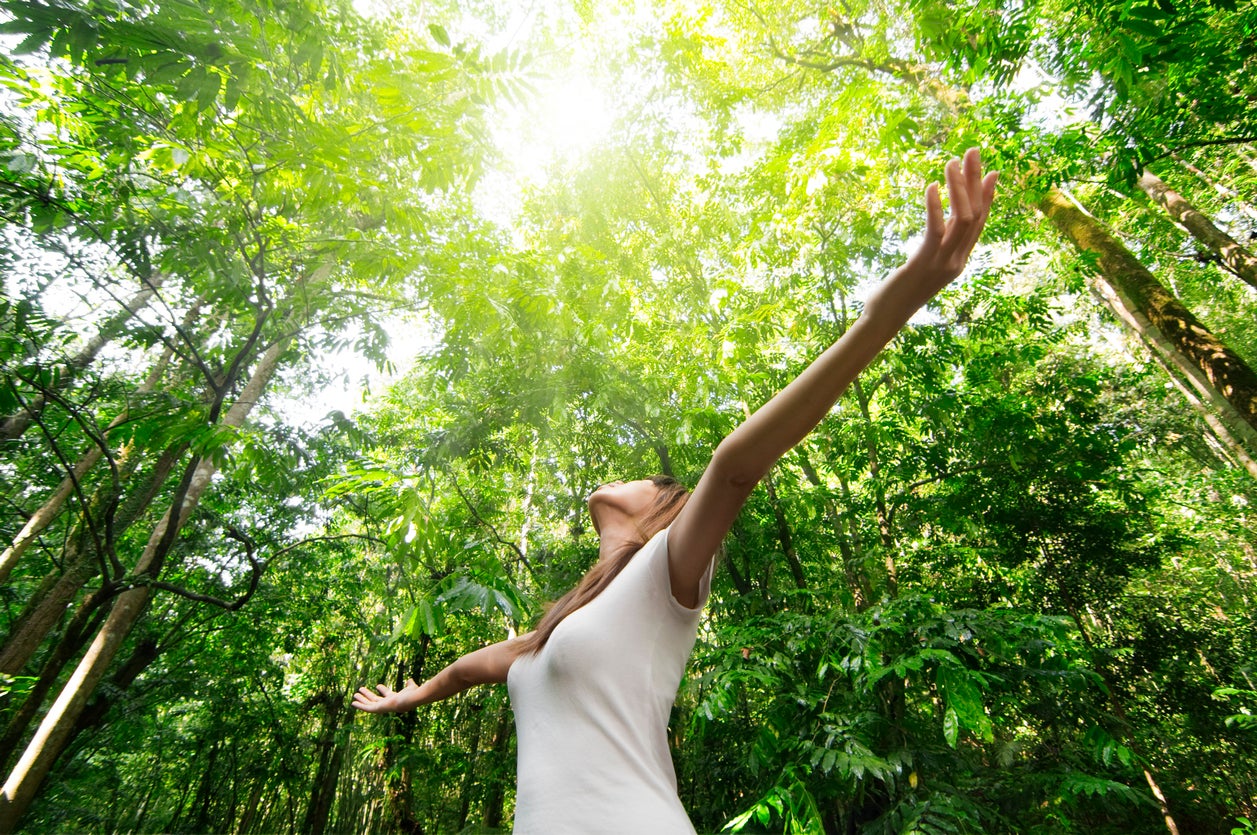Nature is crucial for good mental health – let’s protect this resource for future generations
Our blood pressure drops when we’re exposed to nature, and hormones are released by seeing beautiful landscapes. Nature’s benefits must be highlighted in schools and at Cop26, writes Michael Samuel


The period since the outbreak of Covid in March of last year has been incredibly challenging for people’s mental health: loss, bereavement, furlough and isolation have been a corrosive cocktail. I have seen it through friends and acquaintances but also through my role as chair of the mental health charity, the Anna Freud Centre.
One thing that I have been struck by is how many people have said they have appreciated time in the open air. Partly spending time outdoors, especially in green spaces, offered a release from confinement indoors in lockdown, but was also an opportunity to connect with nature. During Mental Health Awareness Week it’s entirely appropriate that the theme is “Nature”. We have been reminded that the natural environment is good for our mental health.
When I spend time outdoors, I am moved by the beauty of the natural world. Walking in a London park, or hiking with friends in a rural area, is something I relish. When I have felt at a low ebb, nature has consoled and revived me. One of my children, a qualified psychotherapist, believes our relationship with the natural world is vital to our wellbeing and is a strong advocate for ecotherapy.
While people have long made the link between mental wellbeing and nature, ecotherapy has only emerged as a more explicit discipline in recent decades. One of the pioneers was Joanna Macy, whose seminal ideas, The Work That Reconnects, began in the 1970s. The concepts behind it go back centuries, some would say to the Hebrew Bible or the Greek philosophers. There have been some interesting episodes in history, which point to the importance of “healthy mind, healthy body”. When King George III suffered from mental illness in the early 19th century, he was treated by the Lincolnshire physician and clergyman Dr Francis Willis. The monarch received much of his treatment at Kew, with its beautiful gardens.
The famous neurologist Oliver Sacks, who died in 2015, said that in more than 40 years of work, he thought that only two forms of non-medical therapy were effective: music and gardens. Sacks reflected: “I have seen in my patients the restorative and healing powers of nature and gardens, even for those who are deeply disabled neurologically. In many cases, garden and nature are more powerful than any medication.” Sacks’s endorsement is powerful. In recent years, arts and music therapy have become increasingly popular, but there are signs that ecotherapy is becoming more mainstream too.
There is ample research showing that nature is good for our mental health. Research shows that people’s blood pressure drops when exposed to nature. Hormones are released by seeing beautiful landscapes, not to mention the exercise of a walk or run. A walk outside allows us to contextualise our lives, to see our place in a wider ecological system and promotes oneness with nature. The Jungian therapist Mary-Jayne Rust refers to the synchronicity of nature; we can identify with the ebbs and flows, and match it to our state of mind. She writes about a moment when someone desolate had an acorn land in their lap, offering them hope at a time of despair.
It’s no surprise that the pain of loss or trauma can be assuaged by nature. The great environmentalist Sir David Attenborough reports that he has received letters from people recently bereaved, and the one thing that brought them comfort was spending time in the natural world. He reports that “clinically it’s been shown that this helps the healing process”. Nature, therefore, has a positive impact on our physical and neurological condition, but also our spiritual and emotional wellbeing.
As the country climbs the long mountain back to recovery, and also mindful of all the physical and mental struggles people have had, I would like to see a few things happen. First, I would like ecopsychological ideas to be more widely disseminated across the fields of health and wellbeing. It may not work for everyone, but there are many people who can be helped with their mental health illness through a deep connection with nature.
Second, many schools are becoming more proactive on mental health and, as part of this commendable effort, I would like them to embrace nature and to teach about its importance to our mental wellbeing. Finally, with the UK hosting the Cop26 climate talks in November, there is an opportunity to highlight the role of nature for mental health. Perhaps our stressed-out leaders in Glasgow would do well to relax by taking a trip to the Highlands?
Nature can help so much with health and wellbeing. This spans a wide spectrum from a walk with friends to garden therapies. We are realising that if we see nature as a resource, which we do not own but hold in trust for successive generations, we can support environmental responsibility and reap the value of it for the future for our eyes and our minds.
Michael Samuel MBE is the Chair of the Anna Freud Centre and writes in a personal capacity



Join our commenting forum
Join thought-provoking conversations, follow other Independent readers and see their replies
Comments